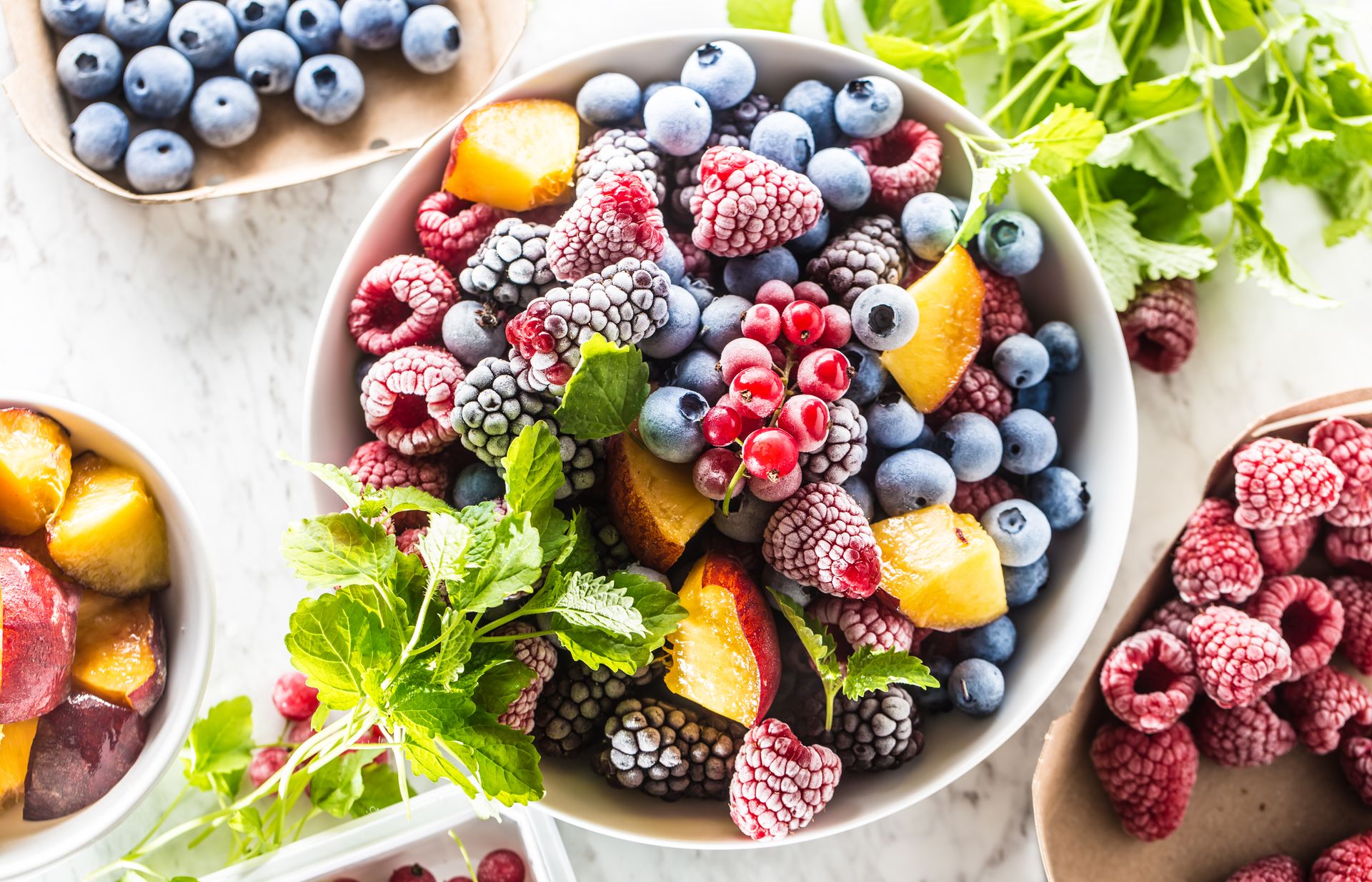It’s clear that fruits and vegetables are a crucial part of a balanced plate, but the reality is that fresh produce only stays good for so long. Depending on how frequently you’re able to purchase more, you may be wondering about the nutrition content of frozen fruits and vegetables. Is it just as healthy and nutritious? What recipes can it be used in? We’re answering these questions and more below!
Fresh Vs Frozen – Which is Healthier?
Unless you grow your own veggies or fruits, most of the fresh produce we consume was picked before it fully ripened, transported (sometimes across state or even country lines), and then stocked at the grocery store. Even once we bring it home, it’s not always consumed right away. So what does all this have to do with nutrition?
Frozen produce is usually picked at the height of ripening, which means it has had more time to develop its nutrient content before being picked. Once harvested, the produce is washed and quickly frozen, which helps retain nutrient levels.
The only downside is sometimes fruits and vegetables are frozen without their peels which may reduce the fiber content and extra micronutrients. It’s also been found that after a year or more of freezing, both frozen fruits and vegetables show a further loss of water-soluble vitamins, so don’t forget to always take inventory of what you have!
One study looked at a handful of common fruits and veggies: broccoli, cauliflower, corn, green beans, green peas, spinach, blueberries, and strawberries. For each item, the nutritional content was compared between fresh, frozen, and “fresh stored” (meaning it was purchased fresh then stored for 5 days at home). Overall vitamin content was not significantly different between fresh, frozen, and fresh-stored. Other studies have found similar results, with some finding frozen produce to be slightly higher depending on the type of fruit or vegetable and storage conditions.
As there’s unlikely to be a significant difference in nutrient content, what’s most important is that you’re getting a variety of fruits and vegetables.
7 Ways to Use Frozen Vegetables
- Replace the fresh veggies in our stacked vegetable enchiladas with frozen ones.
- Make a quick, easy stir fry using frozen veggies, protein, and teriyaki sauce.
- Use frozen cauliflower and broccoli to make our cheesy keto-friendly casserole.
- Make healthier fried rice using frozen veggies, rice, and an egg.
- Add directly into homemade or premade soups and chilis.
- Make a homemade curry with frozen veggies and chickpeas.
- Use frozen spinach in smoothies, pasta sauces, enchilada fillings, and casseroles.
7 Ways to Use Frozen Fruit
- Make sure to check the ingredients list on your frozen fruit for added sugar or additional additives.
- Add frozen berries to overnight oats or chia pudding.
- Use frozen banana slices to make a super thick and creamy smoothie.
- Toss into muffin batter to make healthier, whole grain muffins at home.
- Try our healthier ice cream using frozen bananas and milk.
- Simmer on the stove for an easy fruit compote that can be used on pancakes, waffles, oatmeal, and yogurt.
- Make a simple chia seed jam.
- Freeze grapes for a tasty afternoon snack (seriously so good!).
Freeze Your Own Fruits and Veggies
Freezing fresh fruits and vegetables yourself is easy! Plus, it’s a convenient way to ensure you never let produce go to waste. Just keep in mind that not all produce freezes well. In general, if it has a high water content, like cucumbers or watermelon, it won’t freeze or thaw well. For a complete list of fruits and vegetables that can be frozen as well as tips for freezing, check out our guide here.
The Bottom Line
When it comes to fresh versus frozen fruit and vegetables, both are highly nutritious choices. The key is to pick the option that works best with your budget and lifestyle. Make sure you’re getting a serving of fruits or vegetables at every meal, and use your Lose It! app to watch your progress. When it comes to fresh vs. frozen fruit, both are highly nutritious choices. The key is to pick the option that works best with your budget and lifestyle.
What are your favorite ways to use frozen produce? Share in the comments below!
Edited by: Anna Smith, MS, RDN, LDN 03/22

